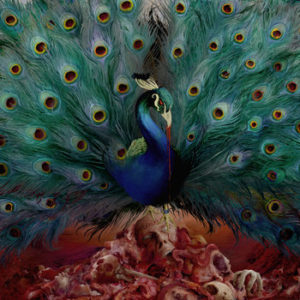 Opeth – Sorceress (2016)
Opeth – Sorceress (2016)
Reviewed by Sebastian Kluth
On its most recent record, Sorceress, Opeth continues its predictable worship of progressive rock of the seventies which began with the weak Heritage (half a decade ago) and continued with the fairly average (by my prog standards) Pale Communion two years ago. The soft retro record recalls a weaker copy of bands such as Camel, Deep Purple, Gentle Giant, Goblin, King Crimson, Jethro Tull, and Pink Floyd. Expect a lot of vintage organs, repetitive guitar desperately trying to build up a hypnotizing atmosphere, psychedelically fragile vocal patterns, folky acoustic guitar parts, and clashing contrasts in volume to evoke an illusion of diversity. Opeth’s continued attempts at recreating the magic of their idols sound elitist, pretentious, and tiring to my ears. What this album doesn’t do is add anything fresh, inspired, or surprising to the mixture, and the heaviest thing about Sorceress is its album cover. In brief, this really is a frustratingly conservative progressive rock album and nothing more..
Admittedly, the positive side of the band’s new identity is that its last three albums might introduce younger generations of metal fans to the fascinating progressive rock legends of yore and inspire them to explore the original artists and albums. The negative here is that Opeth itself has changed its sound so drastically that it has now almost completely lost its own initial (and much more unique) identity as one of the world’s premier melancholic progressive doom/death metal acts.
While I’m open to a band experimenting and shifting its sound, I find that Opeth’s last three albums don’t show any real progression and sound quite alike. In the end, there might be enough material for a great extended EP of half a dozen songs on these three albums combined – which means that there is a lot of redundant filler material. Opeth’s front man Mikael Åkerfeldt has, however, proven that he is able to write atmospherically dense, diverse, and stylistically unpredictable progressive rock music with his highly recommendable side project Storm Corrosion, which features Porcupine Tree front man Steven Wilson. This only makes the latest Opeth release more disappointing.
There are only three songs that I think are above average on this entire album. Somehow I like the title track, where chugging post-rock riffs meet lachrymose vocals. This might not sound very encouraging, but the track has an engaging (if repetitive) rhythm, and turns out to be quite catchy in its simplistic efficiency. Another highlight is definitely ‘’Chrysalis’’, which convinces with an extensive and passionate duel between guitar and organ toward the end. This is a rare vivid moment on the record. The best song is “Era”. Despite a slow start, this track finally offers a coherent progression from calmer folk rock melodies towards engaging progressive rock. It features an emotional guitar solo and the only truly energetic vocal performance of the album. A special honorable mention goes out to ‘’A Fleeting Glance’’, where enchanting acoustic guitar melodies and diversified drum play save the day in the second part of the track, after the first half wastes time with uninspired modern metal riffs, two piano notes, and too many overlapping lackluster vocal tracks. On a side note, a positive point of this record is its airy production, which genuinely recalls classic progressive rock records of the seventies. The sound fits perfectly to the band’s attempt to go back to the golden years of progressive rock, and is a welcome change from the brick-walled loudness of uncountable rock albums these days.
Let’s not forget that this record offers more downsides than positive aspects, however, and the middle section of this album is particularly bad. ‘’Sorceress 2’’ is a sleep-inducing psychedelic ballad of the worst kind, that doesn’t have much to do with the solid title track. ‘’The Seventh Sojourn’’ is almost entirely instrumental, and offers dragged out, gimmicky Middle Eastern folk sounds. So many bands, from Arkan to Orphaned Land to Rob Zombie are trying to incorporate Middle Eastern folk elements in their sound nowadays, and all of them(!) do a better job than Opeth. The band simply repeats the same string melodies and tribal drum patterns for six minutes without any noteworthy evolution. You can find much better attempts at this type of music in any Assassin’s Creed or Prince of Persia soundtrack! Another letdown is the incoherent ‘’Strange Brew’’. The first half sounds like a lethargic attempt at psychedelic soundscapes before overly-dramatic drum rolls and a noisy guitar solo forcefully take the lead in the second half. This song evokes the image of a junkie on a depressing drug trip. If that was the intention of the band, then they might have a point here, but it won’t change the fact that it just sounds terrible. Even though this album is shorter and still features more tunes than most of the other Opeth records, it’s particularly hard to sit through.
To keep it short, Sorceress is for fans of progressive rock of the seventies desperately searching for something to add to the unbeatable genre milestones of said golden age. Those who are expecting a truly progressive sound, elements from different metal subgenres, or fresh and liberating ideas should ignore this album and distrust the numerous surprisingly positive reviews by dependent metal magazines.
2.25 // 5









